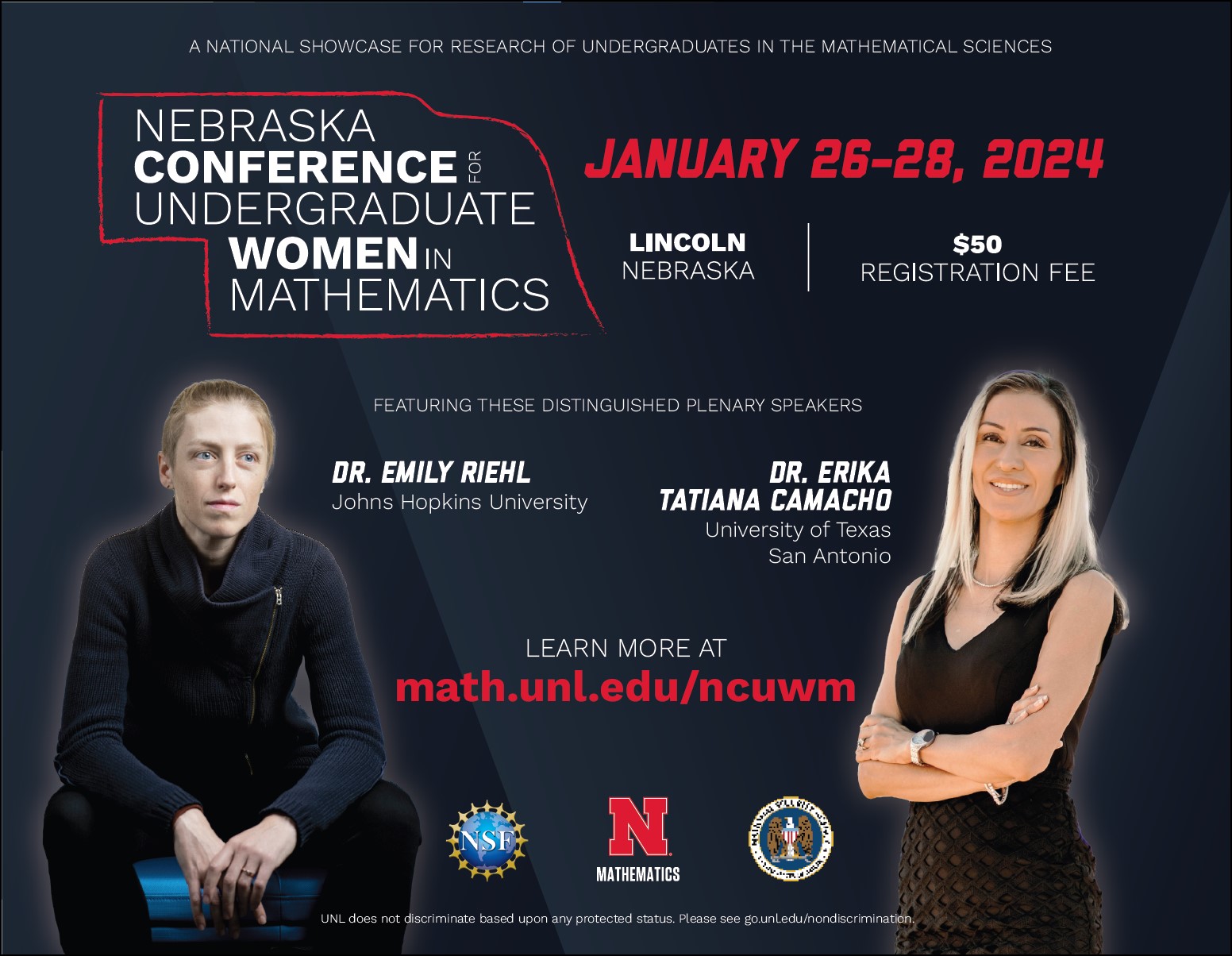
Nebraska Conference for Undergraduate Women in Mathematics (NCUWM)
Registration for the 26th annual Nebraska Conference for Undergraduate Women in Mathematics (NCUWM) is now open. The conference will be held in Lincoln, Nebraska, Jan. 26-28, 2024. UNL students interested in presenting at the 2024 conference must complete an application before Oct. 31, 2023. Non-presenter and faculty registrations will be accepted for as long as we have space through Nov. 17, 2023.
Students will have the opportunity to meet others who share their interest in the mathematical sciences, and those who already have done research will be given an opportunity to present their results.
• NCUWM’s overall goal: To arm participants with knowledge, self-confidence and a network of peers to help them become successful mathematicians. We do this by providing role models, insider knowledge, and an opportunity to present original research. Our focus is to encourage and mentor undergraduate women to pursue graduate study in mathematics and seek mathematical careers. Conference participants also will have a chance to learn about life in graduate school from the perspective of current women graduate students representing math departments from across the country.
• Student presentations: We encourage students who have done original research, loosely defined as work students have done to solve a challenging problem on their own or with colleagues, to submit an abstract for a talk or a poster.
• To apply: Students must be at least 19 years of age at the time of the conference and at least sophomore standing to apply. Registrations will be accepted for as long as we have space through Nov. 17, 2023. We ask that UNL presenters register by Oct. 31. Students who are listed in registrations as co-presenters must also register for the conference by Nov. 17 or before capacity is reached. See https://math.unl.edu/ncuwm for more details. The registration fee is $50**: https://scimath-portal.unl.edu
Follow us on Twitter, Instagram and Facebook for conference updates!
The 2024 conference features two plenary talks by outstanding women mathematicians: Dr. Erika Tatiana Camacho, University of Texas San Antonio, and Dr. Emily Riehl, Johns Hopkins University. Other women mathematicians from academia, industry, and government will participate in panel and small group discussions on a variety of topics. Among the plenary speakers and other invited guests, the conference makes a special effort to provide mentors from underrepresented minorities. Brief biographies of this year’s plenary speakers are included below.
• Dr. Erika Tatiana Camacho has been named the inaugural holder of the Manuel P. Berriozábal, Ph.D. and María Antonietta Berriozábal Endowed Chair as well as a professor in the University of Texas San Antonio College of Sciences’ mathematics and neuroscience, developmental and regenerative biology departments. Camacho’s current research focuses on mathematically modeling and investigating both the healthy and diseased retinas at the cellular and molecular levels. She published the first set of mechanistic models addressing photoreceptor degeneration, providing a new framework to mitigate blindness. In 2022 she was awarded a year-long Fulbright Research Scholarship to conduct research at L’Institut de la Vision-Sorbonne Université in Paris, France. She recently held a three-year position as a program director at the National Science Foundation, where she supported several programs advancing racial and gender equity in STEM disciplines, including the ADVANCE program, the Racial Equity in STEM Education program and the Hispanic Serving Institutions Program. Prior to working at the NSF, Camacho spent 16 years at Arizona State University (ASU), most recently as a professor in the School of Mathematical and Statistical Sciences. At ASU, she co-directed multiple summer research programs dedicated to the recruitment and training of women, underrepresented minorities and others who might not have had the opportunity to pursue higher education in STEM. Camacho’s leadership, research, scholarship, and mentoring have won her numerous national and regional recognition, including the 2019 American Association for the Advancement of Science Mentor Award.
• Dr. Emily Riehl is a professor in the Department of Mathematics at Johns Hopkins University working on higher category theory and homotopy type theory. She is both an organizer and lecturer for the HoTTEST Summer School, a co-host of the n-Category Café, a founding board member of Spectra, and a contributor to the nLab, a category-theory wiki. She serves on the editorial boards for Homology, Homotopy, and Applications, the Journal of Pure and Applied Algebra, and Mathematical Logic Quarterly. In June 2023, Riehl was a visiting professor at the Institute Henri Poincaré-Sorbonne Université in Paris, Francis. Among her most recent accolades, in January 2020, Riehl became the sixth recipient of the $250,000 President’s Frontier Award, which supports Johns Hopkins researchers poised to become leaders in their field. She was also awarded the 2021 AWM Joan & Joseph Birman Research Prize and named a Fellow of the American Mathematical Society in 2022. Riehl played Australian rugby (known as footy) for the U.S. national team in 2011, 2014, and 2017, at an international tournament for national squads hosted in Australia. She now trains for ultramarathons.
Please visit the conference website at: https://math.unl.edu/ncuwm for more information. We look forward to an excellent conference this year!
**UNL students are free. After you select undergraduate, there is a further-along question that asks for your institution and you should choose UNL. Then it will be free. UNL students are welcome to attend the whole conference or present. We hold talk spots for UNL students. The only thing you can’t have is lodging (or travel support).